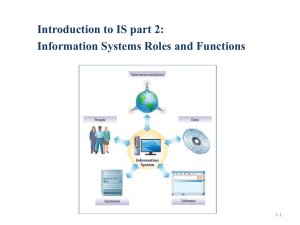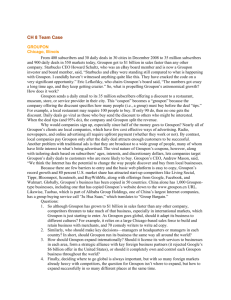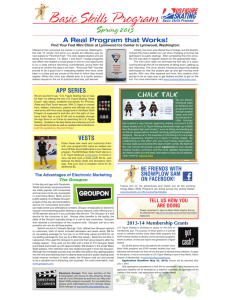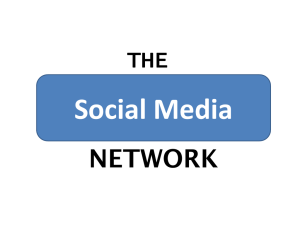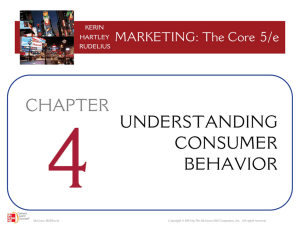Can Groupon.cn Be Another “Groupon”?
advertisement
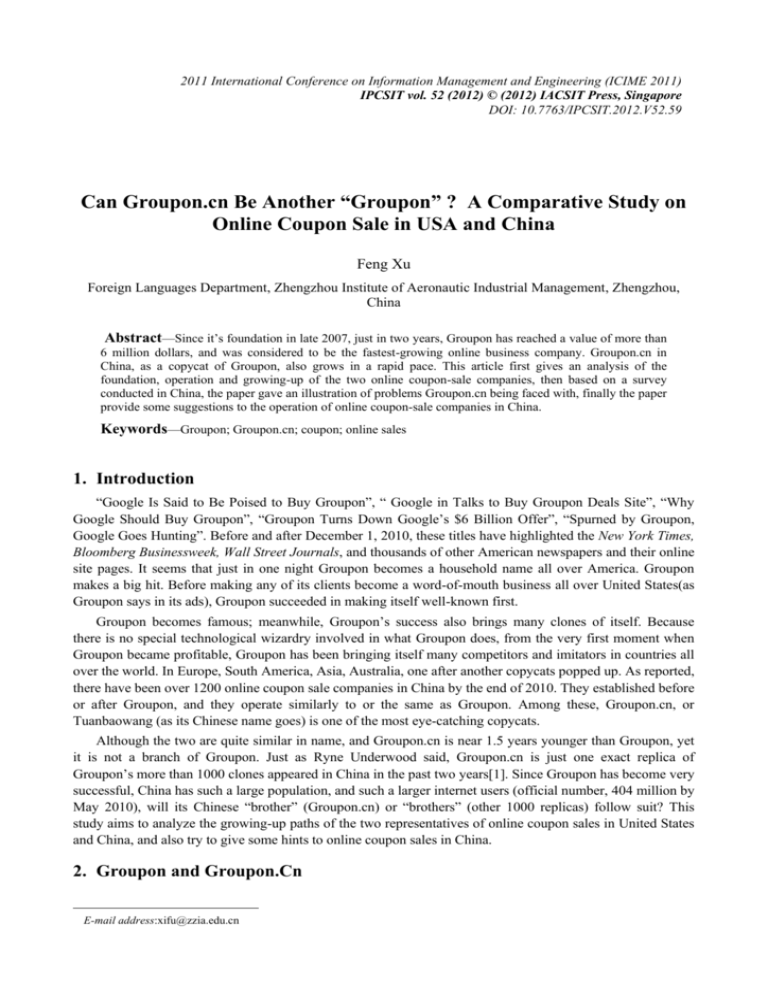
2011 International Conference on Information Management and Engineering (ICIME 2011) IPCSIT vol. 52 (2012) © (2012) IACSIT Press, Singapore DOI: 10.7763/IPCSIT.2012.V52.59 Can Groupon.cn Be Another “Groupon” ? A Comparative Study on Online Coupon Sale in USA and China Feng Xu Foreign Languages Department, Zhengzhou Institute of Aeronautic Industrial Management, Zhengzhou, China Abstract—Since it’s foundation in late 2007, just in two years, Groupon has reached a value of more than 6 million dollars, and was considered to be the fastest-growing online business company. Groupon.cn in China, as a copycat of Groupon, also grows in a rapid pace. This article first gives an analysis of the foundation, operation and growing-up of the two online coupon-sale companies, then based on a survey conducted in China, the paper gave an illustration of problems Groupon.cn being faced with, finally the paper provide some suggestions to the operation of online coupon-sale companies in China. Keywords—Groupon; Groupon.cn; coupon; online sales 1. Introduction ―Google Is Said to Be Poised to Buy Groupon‖, ― Google in Talks to Buy Groupon Deals Site‖, ―Why Google Should Buy Groupon‖, ―Groupon Turns Down Google’s $6 Billion Offer‖, ―Spurned by Groupon, Google Goes Hunting‖. Before and after December 1, 2010, these titles have highlighted the New York Times, Bloomberg Businessweek, Wall Street Journals, and thousands of other American newspapers and their online site pages. It seems that just in one night Groupon becomes a household name all over America. Groupon makes a big hit. Before making any of its clients become a word-of-mouth business all over United States(as Groupon says in its ads), Groupon succeeded in making itself well-known first. Groupon becomes famous; meanwhile, Groupon’s success also brings many clones of itself. Because there is no special technological wizardry involved in what Groupon does, from the very first moment when Groupon became profitable, Groupon has been bringing itself many competitors and imitators in countries all over the world. In Europe, South America, Asia, Australia, one after another copycats popped up. As reported, there have been over 1200 online coupon sale companies in China by the end of 2010. They established before or after Groupon, and they operate similarly to or the same as Groupon. Among these, Groupon.cn, or Tuanbaowang (as its Chinese name goes) is one of the most eye-catching copycats. Although the two are quite similar in name, and Groupon.cn is near 1.5 years younger than Groupon, yet it is not a branch of Groupon. Just as Ryne Underwood said, Groupon.cn is just one exact replica of Groupon’s more than 1000 clones appeared in China in the past two years[1]. Since Groupon has become very successful, China has such a large population, and such a larger internet users (official number, 404 million by May 2010), will its Chinese ―brother‖ (Groupon.cn) or ―brothers‖ (other 1000 replicas) follow suit? This study aims to analyze the growing-up paths of the two representatives of online coupon sales in United States and China, and also try to give some hints to online coupon sales in China. 2. Groupon and Groupon.Cn E-mail address:xifu@zzia.edu.cn 2.1. Who is Groupon? Groupon , an American company with a name that blends "group" and "coupon," has been depicted by Forbes Magazine as ―the Fastest Growing Company Ever‖ ( August 30, 2010 ) ,because just in two years, Groupon has been evaluated to worth 6 billion dollars(just as Google had offered in late November of 2010). According to Groupon’s official website (www. groupon. com) and related reports from New York Times,Wall Street Journal and so on, Groupon started in November 2008, growing out of an earlier company that Andrew Mason(now founder and CEO of Groupon) created in 2007, called the Point, which tried to rally groups of people behind charities and social causes…. In 11 months, Groupon has ballooned from 200 employees to about 1000 people working in the Chicago office and some 2000 more spreading across its sprawling worldwide network. The company is adding more than 200 employees a month. Groupon is projected to make $1 billion in sales faster than any other business, ever, because in two years, the firm, has ballooned to 3,100 employees, 35 million users in 300 markets and more than $1 billion in annual revenue. Groupon now works with businesses in more than 140 cities in 18 countries. Groupon is also namede by Christopher Steiner from the Atlanta as ―the fastest growing company‖[2]. Because no technology stalwart--including Ebay, Amazon.com, YHOO, AOL and Google--grew that big that fast. It is even faster to reach a $1 billion valuation than YouTube (now part of Google). Groupon broke into the black just seven months after inception. 2.2. Who is Groupon.cn? As we have mentioned above, Groupon.cn is not the exact name of the company. It may be the English name of the company or just an abbreviation of its website address. Its real name in Chinese is ―Tuanbaowang‖(Literally to mean ―group buying web site or collective buying web site‖). According to its own introduction on its website (www.groupon.cn), Tuanbaowang was launched in March of 2010, and is the creator and leader of group coupon buying mode in China. Since it started its first online coupon selling in Beijing in March, now it has spread to 325 cities in all parts of China. By October 9, 2010, Groupon.cn has had 30 million subscribers and has brought savings to consumers totaling to 125 million. Groupon.cn began to make profits in its third month, 8 months faster than Groupon. Latest report about Groupon.cn’s market value is estimated to be 2 billion Chinese Yuan (about 0.3 billion U.S. dollars)[3]. We have not any information of how much revenue it had made this year. According to its brief online introduction, Groupon.cn admits having borrowed ideas in the very beginning from Groupon, but it localized Groupon’s operation mode and created many new ways in conducting business. Groupon.cn has become ―the model of online group buying in China‖[4]. 3. How Groupon and Roupon.Cn Work With its headquarters in Chicago, Groupon now works with businesses in more than 140 cities in 18 countries. Among its 3100 employees, 1000 of them work in the headquarters and over 2000 work as salesmen to deal with local vendors in different cities. Salesmen talk directly with local businesses. After salesman had signed a contract with local deals, Groupon will launch an email-based service for them---pay $75 for a $150 massage, say, or $20 for $45 on a restaurant bill. Once enough customers put money down, the deal goes through and everyone's credit card gets charged. If not, the deal disappears, no one is charged, and a new offer is sent out the next day. When Groupon posts an offer on its site, and after the deal is on, it keeps 50 percent of the revenue. In an article titled ―The Groupon Avalanche‖[6], Del Rey presented us an example on what achievements can Groupon brings to its clients: Fremont Brewing had partnered with Groupon to offer a tour of the brewery, a pint of beer, and a pint glass for $7--a discount of more than 50 percent. If Groupon subscribers want an offer, they must pay for it in advance on Groupon's website. The offer isn't valid unless a predetermined number of coupons are sold in a 24-hour period. In one day, more than 1300 Groupon users took Lincecum up on his offer. Lincecum scrambled to order new glassware and instructed his Web developer to whip up an online reservation system over the weekend. He also hired a new employee to help him with the tours. He figures he spent an extra $6,000, but it wasn't all bad. "Anytime you have 1,300 people who are interested in what you're doing, that's great," says Lincecum. "I was thrilled." Groupon now has over 40 million subscribers. They are attained in the following way. Once a person interested in Groupon get on its website, you are first invited to confirm your city, then to enter your email address, then you are accessed to the sales page, and over the page you are required to complete your account with your full name, email address and pass code (to use as later sign-in and also to verify the email), your age and gender, thus you have finished a registration. From this very moment on, every day, you will get an alert mail to direct you to their ―per day per local business‖ coupon buying recommendation. After you pay online to Groupon, you can print the coupon and bring it to the very local vendor. Groupon accumulated its sources of its subscribers this way, but they promise not to leak your information to its clients. Groupon.cn works almost the same way as Groupon, just as we have mentioned above. However, it’s hard for us to know how much commission fees it charges the local clients. One difference lies in its multi-clientsper-day policy (Groupon.cn consider this a great improvement from its original one-client-per-day policy). Another difference tells that Groupon.cn needs a person to provide a phone number and an ID number to guarantee and verify that you are the very buyer of a coupon. 4. Why groupon grow so fast? Just as its own video clip’s describes itself, Groupon’s attraction to consumers and dealers lies in its collective buying power. Before Groupon, there have been many coupon selling companies sell their own or others’ coupons, both online and through traditional ways( newspapers, local vendors and so on), why did Groupon became so successful? Why did Groupon grow so fast? A careful review of information released by Groupon itself and reports on Groupon will provide some clue of answer to the above questions. 1) Focusing on Doing One Thing Unlike many Web companies, from the very beginning, Groupon has been focusing only on one thing: to sell coupons for its clients. Till now, Groupon has not involved in any other business field except for selling coupons. This makes it concentrate to do one thing and leave people a clear view. Just s the New Yorker reported: while Groupon has many a competitors, it's by far the biggest and most respected player around [7]. Rob Solomon, Groupon's president-chief operating officer credits Groupon's rapid success in part to merely being the first to devise the idea of collective buying online to negotiate discounts on products, services and entertainment. ―There's a first-mover advantage that really helps you,‖ he said. ―Until Groupon came along, there wasn't this phenomenon to create something online that moves hundreds of thousands of units in the physical world. We definitely struck a chord with a brand that resonates with small business and consumers, and we're solving problems for both of them.‖[8] 2) Unique Operation System is Attractive to Local Business Groupon grew out of a website called The Point, a website launched in November 2007 to start a campaign asking people to give money or do something as a group — but only once a "tipping point" of people agree to participate. By delaying action until enough people come together to have a real impact, The Point helps consumers, employees, citizens, activists, parents — or anyone — come together and solve problems that they couldn't solve alone. This idea has been transferred to Groupon. Groupon focus on helping local businesses to sell discounted coupons. Their operating mode brings a local business into a non-risk promotion status because only after the buyers reach to certain number will the ―deal‖ on. Groupon usually focus on selling coupons for local restaurants, spas, fitness rooms, manicures, training classes and so on. These are all small businesses. If not Groupon, most of them would never think of having online promotion or putting an ad on a TV or newspaper, but Groupon is helping them to make their company, their restaurant, and their manicure or pedicure city famous or county famous. ―For all the thousands a print ad, radio spot, or TV commercial will cost your business, you get no guarantee in return. Groupon, on the other hand, gives you a fast, easy alternative that achieves marketing goals far beyond the scope of traditional media. This is what Groupon promises to bring to its clients. With its special, extraordinary way of operation, Groupon is attractive to local businesses from the very beginning. According to survey, small local businesses in the above fields are easy to convince, because ―they featured in customers high repeated consumption rate, high random selection chances, low royalty and of course, localness‖[8]. During the recession years starting from 2007, most small businesses in the above mentioned field are not in good operation. If Groupon could help them to bring customers in and make their restaurant or spa be well-known locally, this would be a good way of promotion. On its website, Groupon holds that four points make itself attractive to local clients: a). Valuable new customers guaranteed, b). Efficient and measurable marketing, c). Become the talk of the town, d).Big exposure and bigger word of mouth. Through selling big discount coupons, a Groupon feature puts local business in front of thousands of subscribers in each Groupon city – with thousands more opting in each day. Also, subscribers will share offers with everyone they know via Facebook, Twitter, and other social media to continue to attract new customers for months following the feature. Groupon’s demographics shows: 97% of its subscribers are between 18 and 54 years old, over 82% have a bachelor or higher degree, 49% are single, 77% are female, and most imported, ― they are employed, they have income‖, these are all great attractions to local businesses, because those people are just what small local businesses want to attract. Groupon says it has saved its customers more than $800 million so far this year, up from about $50 million last year. For consumers, that means spending less cash -- always a nice thing in tough economic times. And for local businesses, that means bringing new customers in the door, which makes them happy, too. That's why so many restaurants, stores, and service providers are rushing to get their deals on. 3) Meet the Right Demands of Customers Groupon is built on the hope of attracting tons of loyal profitable customers. Groupon has always been proud of its large source of subscribers and its rapid growth of the number. Just in less than two years, Groupon has attained a subscriber database of 40 million all over the world. How do people become a subscriber? Why do people become a subscriber? How does it grow so fast? All these come from Groupon’s strong appeal to people’s consumption psychology. Groupon’s company philosophy is pretty simple: we treat our customers the way we like to be treated.To buy coupons on Groupon, a customer can save 50-90% of the product value, this makes Groupon especially popular among people during this recession period of world economy. Still, the ― per-day-per-deal‖ policy makes subscribers look forward to seeing who is next vendor , and the ―close-home‖(local-business) policy makes a coupon giver easy to reach. Every night email alert makes a subscriber hard to resist to check the mail, and this is keep it from being treated as a trash mail. One may consider a coupon selling mail in the box as a junk mail, while one will not treat a mail he himself subscribed as a junk mail, because that mail may bring him a surprise. 4) Appearing in the Right time: Recession Helps Groupon surely has know well of its customer and this help it works smoothly both with local business and subscribers. While Groupon’s success also lies in another aspect: Americans’ great interest and proneness to coupon. In 1902, Americans came up with the smart idea of using coupons. Over the years, couponing has become an increasingly important promotional tool in marketing in America, especially for non-durable, packaged products. Donnelley Marketing's 13th Annual Survey of Promotional Practices (1990) states that nearly 100% of surveyed consumer product manufacturers used coupon promotions and that 65% also planned to maintain or increase their coupon budget allocations in the following year. The rapid growth and widespread usage of coupon promotions clearly reflect marketers' confidence in the practice. Their conviction that couponing is beneficial has, in fact, been well supported by many studies that show that coupons do induce consumers to brands and, in some cases, to accelerate purchases (e.g., Blattberg and Neslin 1990)[9]. A recent study indicated that 89 percent of Americans regularly used coupons when shopping for groceries. With over 164 billion coupons offered by retailers in the first half of 2010, this growth builds on the record-breaking trends of 2009 when 311 billion coupons were distributed in the marketplace. In fact, nearly $3 billion was saved using coupons last year alone. The recession started from 2007 didn't help many industries, but it may prove the savior of print coupons. Last year, redemption of coupons that do go through clearinghouses surged 23% to 3.2 billion coupons (and up 30% to $3.5 billion in value) in the U.S., the first gain in 17 consecutive years, according to data from Valassis Communications, which also owns NCH, one of the largest coupon clearinghouses[10]. Maintaining growth against comparisons like that seemed unlikely going into 2010, particularly amid a recovery, however mild. Yet it's happening. Through the first nine months of 2010, coupon redemption is up another 5.3% to 2.5 billion vs. the year-ago period, with the value of coupons redeemed up 7.7% to $2.8 billion[8]. Newspaper inserts still prevail, but as a younger generation gets hooked on print coupons, they'll likely be ones that arrive in the mail or from their own printers. 5) Easy access to internet and guaranteed service Groupon’s potential subscribers are mostly young men, the employed. Due to convenient and wide-spread WIFI technology, the targeted subscribers of Groupon has easy access to internet and are used to online purchase. This guarantees Groupon wide reach to its potential subscribers. Groupon’s guaranteed service and safe paying method also make it reliable. Good reputation in service has been the motto of Groupon from the very beginning, just as The Groupon Promise goes: if Groupon ever lets you down, we’ll return your purchase—simple as that. ―We sell stuff we want to buy; No BS; Unbelievable customer service‖[11] are Groupon’s few key things to customer service. Based on the above principles, Groupon will not only provide cheap product, but also good guaranteed good service, because ―A great price is only half the battle - it's also got to be a great product or service‖; Groupon will not have any buried conditions and Gotchas" because that ― sour your experience‖; Groupon will not let ―you suffer through hour-long "transfer-athons" with customer service departments, or waiting days for an email reply to a simple question‖, they will ―do what it takes to make things right - and do it fast‖. 6) Word of Mouth Effect Groupon started from selling coupons for small businesses like manicures, restaurants and spas in Chicago, but its success soon aroused interest of local media in Chicago and Michigan. With its miracle, incredible rapid growth and a few of its successful cooperation with some nationwide merchandises, such as Gap, Sears, NBA and so on, Groupon soon drew attention from many nationwide media, such as CNN, ABC, CBS, NBC, the Washington Post, New York Times, Wall Street Journal and so on. These reports bring Groupon a word of mouth effect and they soon helped Groupon become a even more well-kown and popular company. Groupon’s cooperation with Gap has aroused much debate on newspapers, TV shows and internet, and also was said to have brought it much reputation. On Aug 19, 2010 , Groupon launched its first national deal, partnering with Gap to offer $50 worth of apparel and accessories for $25. Groupone sold 445,000 vouchers in first nationwide promotion, about 10 Groupons per second, making it Groupon’s bestselling deal since its launch in November 2008. Although the high demand caused Groupon's servers experienced technical difficulties,yet just in one day, Groupon made a big profit of around 5.5 million( half of Gap’s sale based on this coupon sale promotion), and more important, Groupon thereafter became a well known company all over the country. It made Groupon so famous that soon it spawned hundreds of thousands of sales. 5. Will groupon.cn be a miracle in china? Groupon has become a business miracle: just in two years, Groupon’s market value has reached 6 million and is increasing its database of subscribers and trying to enter more cities in the world. As a clone, and a good clone, Groupon.cn is also developing rapidly in China. It is reported that by December of 2010, just in 10 months, after its second fund-raising of 400 million, Groupon.cn is estimated to value 2 billion Chinese Yuan (about 0.3 US dollar). With such a trend and such a large population, and such a large source of internet users in China, will Groupon.cn grow as fast as or faster than Groupon? To answer this question is definitely a difficult question, while a general survey of the online coupon sale and analysis of China’s online buying context may provide us some hints to Groupon.cn’ future in China. In the following part, we generalize some factors influencing China’s online coupon sale and a case analysis is also given to Groupon.cn. The generalization and analysis are based on literature review and a small-scaled survey conducted by the researcher. The survey was conducted from October 7 to December 7 in 2010. In the two months period, questions in Table 1 is given to subjects in Zhengzhou, Beijing, Shanghai, Guangzhou and other over 20 cities to friends, former classmates, new acquaints in meetings, travelers on train and bus, college students and graduates, surely there are also friends of friends. All together 100 subjects are included. Questionnaires were then analyzed. TABLE I. QUESTIONAIRE ON PEOPLE’S ATTITUDE TOWARD COUPONS IN BIG CITIES IN CHINA 1 2 3 4 5 6 questions Do you often use coupons? Do you collect in-store coupon or out-store coupons? Do you buy online coupons? Do you trust online coupons? Why? Do you trust group buying coupon? Have you ever heard about Groupon.cn (tuanbaowang)? Based on our survey and previous literature, we find the following factors have been influencing the online coupon sale in China. 5.1. People’s low faith in coupons Chinese are using coupons, but coupon has never aroused people’s strong interest, not to say proneness. Like people in America, people in China also want to save money, but ―Chinese people generally don’t trust coupon and issuers of coupon very much‖[12]. Wei Nong[12] listed the following reasons ―to cause people lose interest in coupons‖. First, products sold by coupon is usually with low quality or close to expiration date. Second, many sellers would raise the price before issuing a discount coupon. Third, seller does not sell by coupon, a coupon may not be accepted or there will be no difference in price whether you have a coupon or not. Fourth, discounted price is related with ―discounted service‖. Groupon.cn has no special way to solve the problems. This may be a deadly problem. Many local businesses appearing on Groupon.cn still make subscribers doubt their cooperator’s too much discount (over 90%). For example, one frequent cooperator of it in one city is selling its coupon for hair-dressing; the discount rate is 99.6%. With a 48 yuan coupon, one can enjoy a service originally valued 1580 yuan. Is it true? It looks too good to be true. Will a hair dressing really that expensive before the discount? Further investigation finds that the barber shop has always been issuing discount coupons ever since it opened two years ago. People can get its coupons everywhere. Another example goes like this: a judo training class is selling coupons of 3 yuan (originally total 150 yuan) for attending 3 classes. People will never know the fact or we can also say that everyone knows the fact: this training class is just making use of Groupon.cn posting an ad for it. Because usually you do not need to pay anything for 3 trial listening class and this is the common promotion of any training classes. These will surely make Groupon.cn lose faith from its subscribers if they are not well solved. 5.2. Online Coupon’s Low Credibility If we put into the Chinese word ―youhuiquan‖ (coupon) in Google or Baidu, one can surely find thousands of online coupon selling companies. In our survey, over 90% subjects give the negative answer to the question of whether trust online coupon. 0ver 95% people have never tried to buy coupon online, and over 80% percent do not trust online group coupon sale. Internet makes online coupon sale possible. Internet also makes the tricks of online coupon sales company reach afar. There are so many coupon selling companies online; one can hardly tell which is selling coupons and which ―selling ads‖ is. It is reported that over the 1000 coupon selling companies, many are earning profit by keeping the money of no-consumption coupons, because most companies will not refund a coupon once sold. Many other companies make money by posting fake coupons for businesses, because they can bring popularity to those companies and they will pay them in return. Groupon.cn promises to ―refund any time with an unused coupon‖ may help to raise its online credibility, but will the other online sale or coupon sale companies follow? 5.3. Big risk of online payment Due to the insecure online payment system in China, many people dare not to pay or buy on line. A report on online buying situation issued by ―jinshan wangluo‖ shows, 100 mililion online cheat cases in 2010 brought 15billion yuan losses to subscribers. Too much cheating, too much hooking and Trojan horse trick make people lose their faith in online coupon buying. Groupon.cn’s refunding promise may help to solve the problem, but many people still worry a Trojan website can overlap Groupon.cn. Just as an internet safety expert says, if Trojan virus problem is not saved and secure online payment system is not established, online buying in China can never be a safety. 6. Conclusion Groupon refused the purchase offer of Google for it believes it can make a bigger market and more profit all over the world. As a representative of online coupon selling company in China, Groupon.cn is trying to make itself a good copycat. While analysis of the China online coupon buying situation does not give us any hints that Groupon.cn will create another ―Groupon miracle‖. 7. References [1] R. Underwod, ―Suddenly, Everyone Wants to Be Groupon‖ Advertising Age, Vol. 81, Issue 39, NOV, 2010, pp. 18-20. [2] D. Frommer, ―Why Groupon Was Smart to Spurn Google's $6 billion offer‖, Business Insider, December 10, 2010. [3] Y. Sun, ―Online buying to Surpass 430 billion‖, http://www2.highlandstoday.com/content/2010/sep/19/couponshopping-30. Retrieved Dec.17,2010 [4] L. Huang, ―Study on e-coupon‖, Internet Weekly, (18), Jan. 2011, pp.18-19. [5] W. Chen, ―China has an internet surfer 0.404 billion‖, http://finance.ifeng.com/roll/20100501/2135752.shtml. Retrieved on Dec. 12, 2010. [6] D. Rey, ―Groupon Avalanche‖, Jason Inc., Vol. 32, Iss. 3, Apr. 2010, pp. 102-104 [7] J. Surowiecki, ―Groupon Cliping‖, The New Yorker, Vol. 86, Iss. 41, Dec 20, 2010, pp. 46-47. [8] S. Brad, ―Coupon Deathmatch, Party of Two? ‖,Bloomberg Businessweek, Issue 4198, OCT.2010. [9] L. George and M. Rex, ―The Effect of Sales Promotion Type and Amount on Internal Reference Price‖, Pricing Strategy and Practice, 4, (1) , 1996, pp.21-27. [10] C. Pierre, W. Brian & L. Gilles, "A Benefit Congruency Framework of Sales Promotion Effectiveness", Journal of Marketing, 64, Oct. 2009, pp.65-81. [11] J. Zhang, ―America:coupon as the powerful weapon of marketing‖, Shanghai Economy, (3), 2009, pp. 25-26. [12] Wei Nong, ―Study on e-coupon‖, Internet Weekly, (18), Jan. 2009,pp.18-19.
